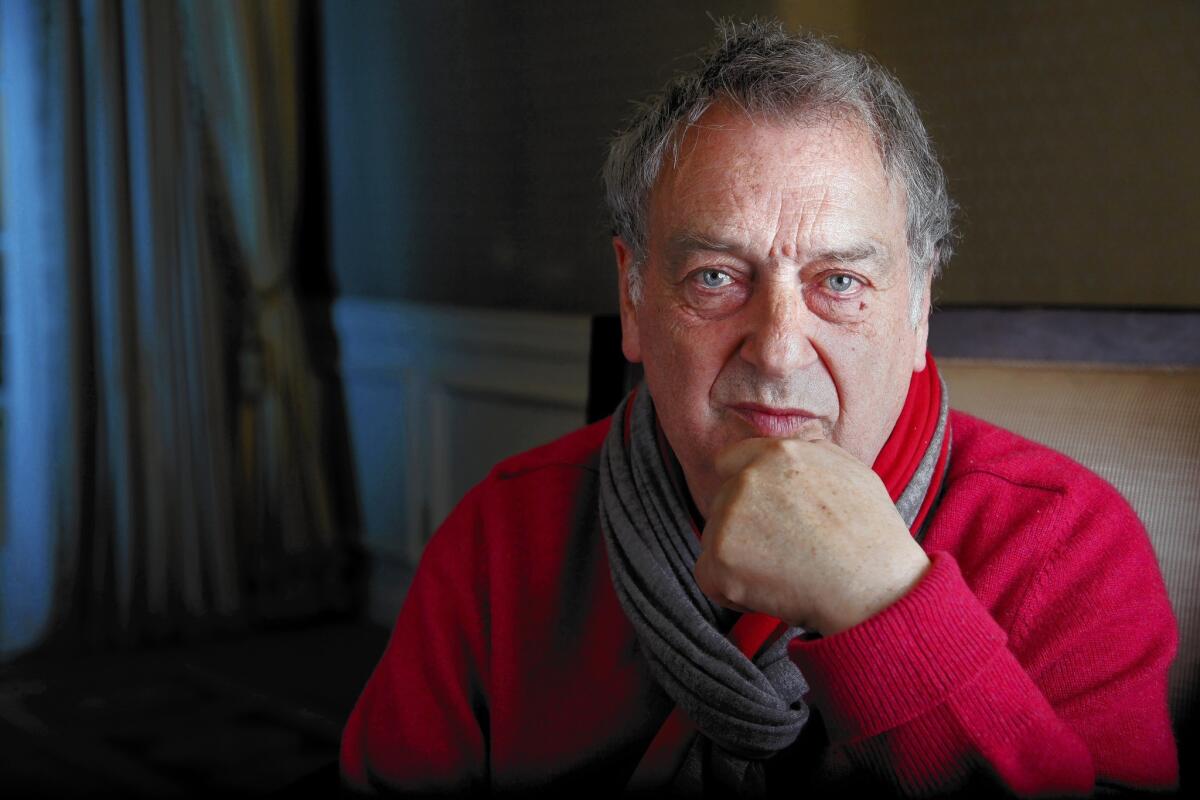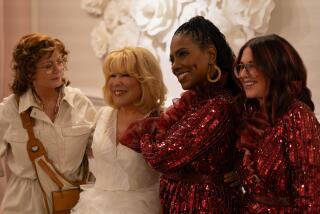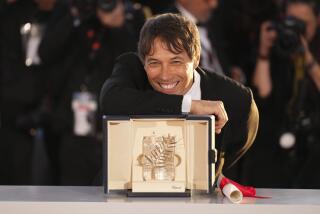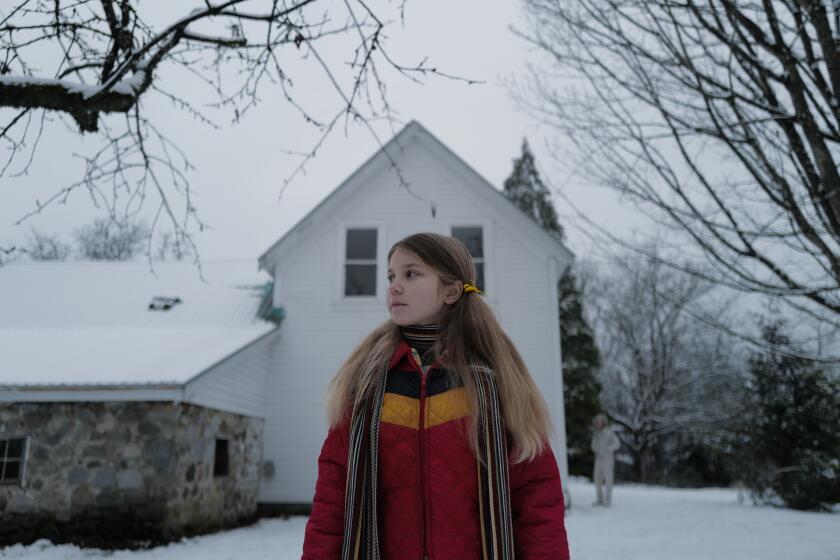Stephen Frears likes his women strong

He came in from the rain wearing a scarf, tattered pants, unlaced canvas tennis shoes and a sweater somewhere between the colors of plum and rust. His hair looked like an approaching storm, and he had missed a spot shaving just above the collar. His publicist — he’s not crazy about publicists — whispered a friendly warning: “Have you met Stephen before? He can be a bit dry, he has a dry sense of humor. British.”
Stephen Frears, the director, walked past the concierge, through a half-lighted, polished lounge at the Four Seasons in Beverly Hills. He spotted a seat on a covered patio. The rain kept falling. He said he felt like Frank Sinatra, trotted out into the limelight for a new song. He was pleasant, if tired, chatting about virtue; religion (he’s not devout); artistic independence; the early days of his career; his ambivalence toward Hollywood and those magical details, such as Anjelica Huston’s legs or Gary Oldman’s sly whimsy, that conspire to frame a scene.
He was in Los Angeles on a recent intemperate morning to promote his new film, “Philomena,” based on the true story of a woman’s quest to find the out-of-wedlock son the Roman Catholic Church forced her to give up 50 years earlier. Starring Judi Dench and Steve Coogan, the movie is a sensitively calibrated road comedy in the manner of “It Happened One Night” and an indictment against the church in Ireland, which for decades banished unwed, pregnant girls to work in convent laundries while putting their children up for adoption.
OSCAR BUZZMETER 2014: Pundits’ picks
“Philomena” has been nominated for a Golden Globe for motion picture, drama and Dench, who plays the title character, a mother of deep faith on a seemingly quixotic adventure with a petulant journalist (Coogan, who also co-wrote the book-adapted screenplay), is up for actress in a drama. The film is a study of forgiveness, sanctity, corruption and, when truths are finally revealed, transcendence. Philomena’s simplicity and unadorned determination — she quotes romance novels and is fascinated by hotel TV — are more profound than the centuries-old institution opposing her.
“I can’t pretend I’m devout. It’s a mystery to me,” said Frears, 72. “I’m as prejudiced against Catholics as everybody is. It’s not very difficult to attack the Catholic Church. [But] the writers didn’t just want to attack the church. They wanted something more complicated. ... There is still a lot of it I don’t understand. Maybe it’s that a lot of it is about innocence.”
The director, who faced the trick of balancing comic banter with the darker edges of Philomena’s anguish, said he had never considered making a film dealing so overtly with the ecclesiastical. “But religion is important to a lot of people,” he said, “and maybe that’s more interesting than I realized.”
Unheralded lives caught amid the grains of larger forces shaped Frears’ works in the 1980s, including “My Beautiful Laundrette,” which brought Daniel Day-Lewis international attention, and “Sammy and Rosie Get Laid.” Those stories of poetry and piquant humor, both written by Hanif Kureishi, explored immigration, racism, conflicting ambitions and unrequited desires during the harsh economic rule of former British Prime Minister Margaret Thatcher, who Frears said once quoted the prayer of St. Francis of Assisi only to “systematically destroy” it with her policies.
PHOTOS: Behind the scenes of movies and TV
“There was a time when I made films and they were all about gay people or Pakistanis or women,” he said. “Films about women are generally subversive. They were all subversive and then I somehow stopped doing that . But I didn’t know at the time that that’s what I was doing.”
Was there a link between those narratives and other films?
A furrowed brow. A pause. The rain quieted. A cigarette.
“You’d have to ask a psychoanalyst,” he said. “ I don’t brood about it and I’d much rather be unself-conscious. I have no desire to make the same film twice.”
Dench’s Philomena is the latest of Frears’ strong women characters. They are a strikingly eclectic lot, haunting alleys and palaces, forces unto themselves, including Helen Mirren’s prim turn as Queen Elizabeth in “The Queen,” Glenn Close’s corseted, scheming aristocrat in “Dangerous Liaisons” and Huston’s platinum-haired con artist in “The Grifters.”
“I’ve really only ever known strong women in my life. I don’t know where all these weak women are. You know, they’re all tough broads,” Frears, who is married to painter Anne Rothenstein, said of Mirren, Dench and others. “You have to be on your toes. If you’re an idiot they’ll tell you.” He said as a director “you try to make a film that’s a bird’s nest in which they can sit. I can’t tell Helen or Judi anything about acting. ... You know what British actors are like. They just do it.”
PHOTOS: Celebrities by The Times
As a boy and a young man, Frears, who would later work as a director for the BBC, was struck by film images such as Robert Mitchum “smoking a cigarette and walking down the street.” One of his first brushes with American movies was “Red River,” starring John Wayne and Montgomery Clift as cattle drivers. The innocence epitomized by the western would fade against French New Wave and Italian neo-realism films that reflected society as “cinema became self-conscious.”
Another pause. Frears is comfortable in the silence between words. A valet’s voice echoed beyond the courtyard wall.
“You know, a lot of the work is very technical,” he said. “I know you’re not supposed to say that in the age of the auteur. ... I’m rather against the whole notion. I enjoy being collaborative.”
Frears has no distinct style; his rhythm and direction conform to the story at hand. His success on independent films landed him his first Hollywood studio movie, “Dangerous Liaisons” (1988), which was nominated for seven Academy Awards, including best picture. But some of his follow-ups were disappointing, including “Mary Reilly” with Julia Roberts, which Kenneth Turan of The Times said was a series of “miscalculations that turned what seemed like a promising project into a grim reaper of a movie.”
“The truth is, I came to Hollywood,” said Frears, reminiscing over the sting of a past infatuation. “I got asked to make a studio film. ‘Oh, I see the price. You win with the best independent film and the price is giving up your independence. ... In an odd sort of way it made me realize how independent I was, much to my surprise. I’ve always enjoyed American studio films and I worked with these big actors and they were very good. I think I thought I could make films with big stars but it turned out I couldn’t. I simply don’t understand that world.
PHOTOS: Box office top 10 of 2013
“You make films in a much more public way,” he added. “It probably disconcerted me.”
Any man who has lived into his 70s has seen technology eclipse what once seemed so tangible. Filmmaking equipment has grown smaller and more nimble from “how creaky the whole thing was,” said Frears, who is at work on a biopic about disgraced cyclist Lance Armstrong. “The phenomenal weight of the cameras. ... The whole time you’re trying to figure out what the modern world is like and realizing the gap between you and it.”
The success of much of his career has been telling smart, resonant stories; the quirks and eccentricities of the desperate and the searching, even the refined souls among them. “You just sort of do it,” he said, “and if you’re lucky you get it right.” He spoke on, his eyes watery from jet lag. A publicist appeared like an aberration. It was time to walk back through the lounge and past the concierge to another room where another publicist stood near a table of juice and coffee.
The publicity of marketing a film “has exploded,” he said, noting he was in Calcutta in 1985 when “My Beautiful Laundrette” opened, and only knew of the film’s release because of the review in the newspaper. He smiled at that. So ancient, so quaint, it had seemed.
A photographer set up portrait lights. Frears fixed his scarf and took a seat. It was still only morning.
More to Read
Only good movies
Get the Indie Focus newsletter, Mark Olsen's weekly guide to the world of cinema.
You may occasionally receive promotional content from the Los Angeles Times.











